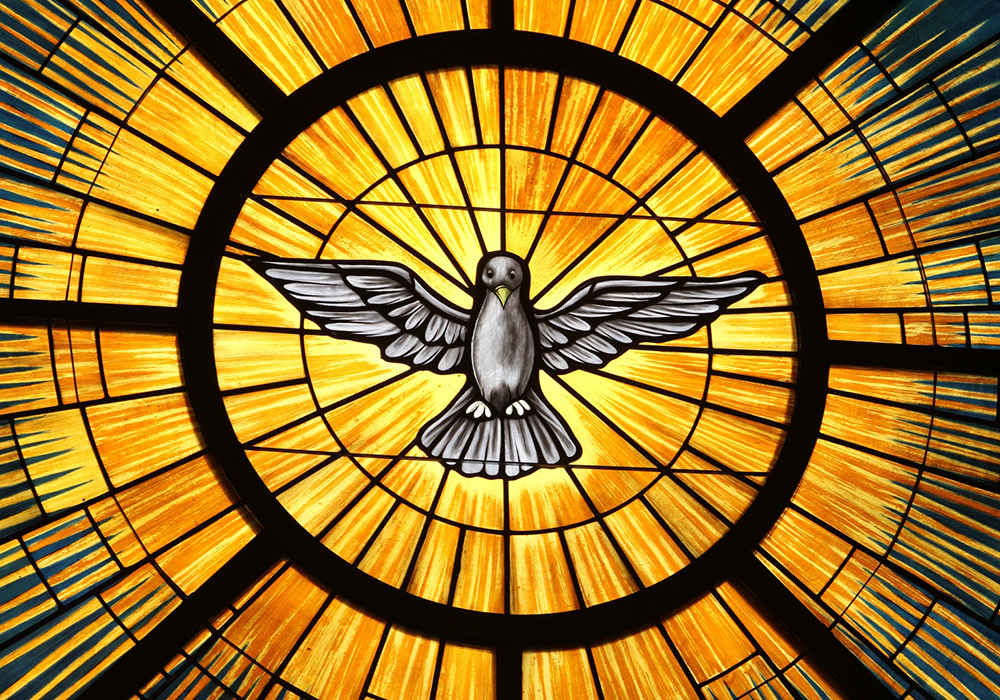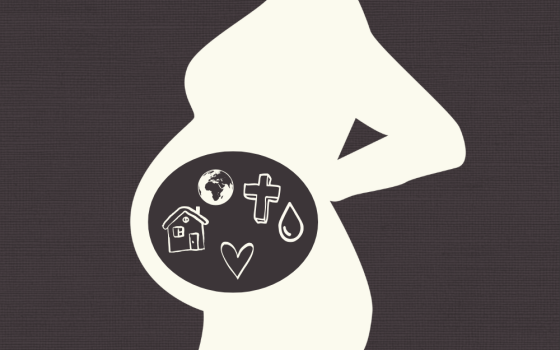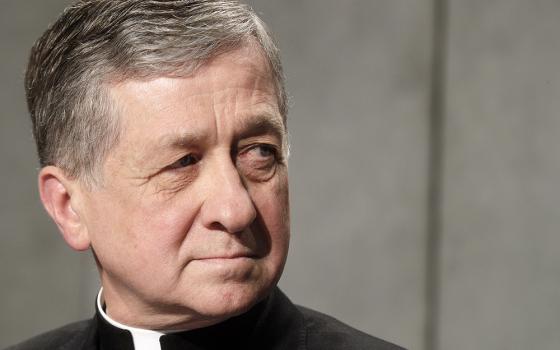
The Holy Spirit, traditionally depicted as a dove, is pictured in a stained-glass window at St. John Vianney Church in Lithia Springs, Georgia. The feast of Pentecost, marking the descent of the Holy Spirit upon the apostles, is May 24 this year. (CNS/Georgia Bulletin/Michael Alexander)
I always liked the feast of Pentecost. Chapter 2 of Acts describes it so well. I can hear "what sounded like a violent, rushing wind from heaven; the noise filling the entire house" where the people were gathered. I can see that tongue of fire first appearing "then separating and coming to rest on the head of each one." I can hear the different languages coming to life, as those gathered came from "every nation under heaven." The words of the disciples being understood in each person's native tongue — the Spirit of the risen Christ fully given to each in their diversity.
In hearing the same Gospel message, they were momentarily made one and interconnected. Each understood the common message being preached by the Apostles yet within their own language. They didn't need a translator. No one language dominated, requiring others to struggle with nuances and interpretations. They didn't need to compensate for their differences. Like a light shining through a prism refracts into a rainbow of colors, the gift of the Spirit refracted into a multicultural, multilingual, rainbow of followers. In their diversity, they experienced the oneness of the Spirit.
Pentecost uses language not to divide people, but to show how it can also serve the oneness of what we value and believe. Pope Leo XIV in his address to media professionals, days after being elected, focused on the power of language. He said that our world today can leave us lost in a "confusion of loveless languages that are often ideological or partisan." He also said that "we must say 'no' to the war of words and images." He added, "Let us disarm communication of all prejudice and resentment, fanaticism and even hatred. … Let us disarm words, and we will help disarm the world."
Pope Leo understands the power of language and how it has become so divisive. It seems as if every word, every initial, means something different to each of us. We tend to see only the parts which lend themselves to either/or ways of thinking, to seeing polarities only as opposites. The differences are saturated with emotion, which distorts our vision and keeps us from understanding the larger context, the overarching values, and the more encompassing vision shared by humanity.
Today, many people write about the emerging consciousness which speaks to a way of seeing reality first in its wholeness before it unfolds into individual expressions. Many mystics experienced something similar. It seems we need such a way of seeing more than ever today.
It seems we need to see a both/and world — to see polarities not as irreconcilable differences but as complementary movements within a whole. It seems we need a Pentecost.
Pentecost invites us to see in new ways that the gift of the Spirit — Divine energy — does not come fragmented, expressed incoherently among us, but rather comes in its wholeness, as one tongue of fire, which then freely given, expresses itself uniquely in each of us.
Advertisement
Contemplation awakens us to this way of seeing the world. In many of the programs that the Institute for Communal Contemplation and Dialogue offers, we focus on what this way of seeing might mean. After sitting in contemplation, deepening the spaciousness within, we ponder: What could it mean if we understood that difference is not division? That oneness is not sameness? That understanding is not condoning? That disagreement is not conflict?
Would such a way of seeing change how we speak to each other? How we write about the critical issues facing us as a nation and a global community? How we open ourselves to hear other positions than our own?
I believe Pentecost gave a jump start to the newly emerging church to see and live out of this vision. Of course, over time, we continue to fail. Luckily, Pentecost's yearly celebration reminds us to renew this way of seeing.
Perhaps, more than ever, we all need to heed it — regardless of religious persuasion. Let us try to see from wholeness while respecting each person's unique expression. Let it free us from fear of difference so we can walk in love, together, into the future.





